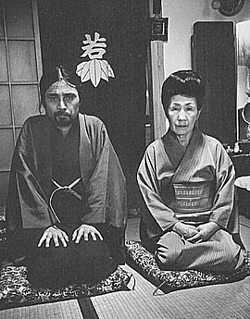A nation is a large type of social organization where a collective identity has emerged from a combination of shared features across a given population, such as language, history, ethnicity, culture, territory or society. Some nations are constructed around ethnicity while others are bound by political constitutions.

Cultural diversity is the quality of diverse or different cultures, as opposed to monoculture. It has a variety of meanings in different contexts, sometimes applying to cultural products like art works in museums or entertainment available online, and sometimes applying to the variety of human cultures or traditions in a specific region, or in the world as a whole. It can also refer to the inclusion of different cultural perspectives in an organization or society.

David C. Korten is an American author, former professor of the Harvard Business School, political activist, prominent critic of corporate globalization, and "by training and inclination a student of psychology and behavioral systems". His best-known publication is When Corporations Rule the World. In 2011, he was named an Utne Reader visionary.

Henry Mintzberg is a Canadian academic and author on business and management. He is currently the Cleghorn Professor of Management Studies at the Desautels Faculty of Management of McGill University in Montreal, Quebec, Canada, where he has been teaching since 1968.

Tatsumi Hijikata was a Japanese choreographer, and the founder of a genre of dance performance art called Butoh. By the late 1960s, he had begun to develop this dance form, which is highly choreographed with stylized gestures drawn from his childhood memories of his northern Japan home. It is this style which is most often associated with Butoh by Westerners.
The International Campaign Against Aggression on Iraq (ICAAI) was a campaign umbrella group launched in Cairo 2003, at the Cairo Anti-war Conference, to oppose the invasion of Iraq.

John Perkins is an American author. His best known book is Confessions of an Economic Hit Man (2004), in which Perkins describes playing a role in a process of economic colonization of Third World countries on behalf of what he portrays as a cabal of corporations, banks, and the United States government. The book's claims were contested by some involved parties. The book spent more than 70 weeks on the New York Times bestseller list.

Confessions of an Economic Hit Man is a semi-autobiographical book written by John Perkins, first published in 2004.

Jean Hazel Henderson was a British American futurist and environmental activist. As an autodidact in her twenties, having only a British high-school formal education, in the U.S. she gradually advanced, by virtue of groundbreaking citizen activism, into the roles of university lecturer and chair-holder, as well as that of advisor to corporations and government agencies. She authored several books including Building a Win-Win World, Beyond Globalization, Planetary Citizenship, and Ethical Markets: Growing the Green Economy.
Nation branding aims to measure, build and manage the reputation of countries. In the book Diplomacy in a Globalizing World: Theories and Practices, the authors define nation branding as "the application of corporate marketing concepts and techniques to countries, in the interests of enhancing their reputation in international relations." Many nations try to make brands in order to build relationships between different actors that are not restricted to nations. It extends to public and private sectors in a nation and helps with nationalism. States also want to participate in multilateral projects. Some approaches applied, such as an increasing importance on the symbolic value of products, have led countries to emphasize their distinctive characteristics. The branding and image of a nation-state "and the successful transference of this image to its exports - is just as important as what they actually produce and sell." This is also referred to as country-of-origin effect.
A cultural divide is "a boundary in society that separates communities whose social economic structures, opportunities for success, conventions, styles, are so different that they have substantially different psychologies". A cultural divide is the virtual barrier caused by cultural differences, that hinder interactions, and harmonious exchange between people of different cultures. For example, avoiding eye contact with a superior shows deference and respect in East Asian cultures, but can be interpreted as suspicious behavior in Western cultures. Studies on cultural divide usually focus on identifying and bridging the cultural divide at different levels of society.
Migrant literature, sometimes written by migrants themselves, tells stories of immigration.
Civic nationalism, otherwise known as democratic nationalism and liberal nationalism, is a form of nationalism that adheres to traditional liberal values of freedom, tolerance, equality, and individual rights, and is not based on ethnocentrism. Civic nationalists often defend the value of national identity by saying that individuals need it as a partial shared aspect of their identity in order to lead meaningful, autonomous lives and that democratic polities need a national identity to function properly.

Palgrave Macmillan is a British academic and trade publishing company headquartered in the London Borough of Camden. Its programme includes textbooks, journals, monographs, professional and reference works in print and online. It maintains offices in London, New York, Shanghai, Melbourne, Sydney, Hong Kong, Delhi, and Johannesburg.

Place branding is a term based on the idea that "cities and regions can be branded," whereby branding techniques and other marketing strategies are applied to "the economic, political and cultural development of cities, regions and countries." As opposed to the branding of products and services, place branding is more multidimensional in nature, as a 'place' is inherently "anchored into a history, a culture, an ecosystem," which is then incorporated into a network of associations, "linking products, spaces, organizations and people." As such, the concepts of nation branding, region branding, and city branding, fall under the umbrella term of place branding.

City marketing or Place Marketing is the promotion of a city, or a district within it, with the aim of encouraging certain activities to take place there.
The Presidential Council on Nation Branding was established on January 22, 2009, by Executive Decree 21283 with the objective to develop South Korea's national brand value. The council was abolished on March 23, 2013.
Peter Block is an American author, consultant, and speaker in the areas of organization development, community building, and civic engagement.
John Izzo is a businessman, corporate advisor, speaker, bestselling author and an advocate for sustainable living. He is an adjunct professor at the University of British Columbia where he is a co-founder of Blueprint''. He writes and speaks about the "World of work". Izzo is the author of nine books.

The Good Country Index measures how much each of the 163 countries on the list contribute to the planet, and to the human race, through their policies and behaviors.











